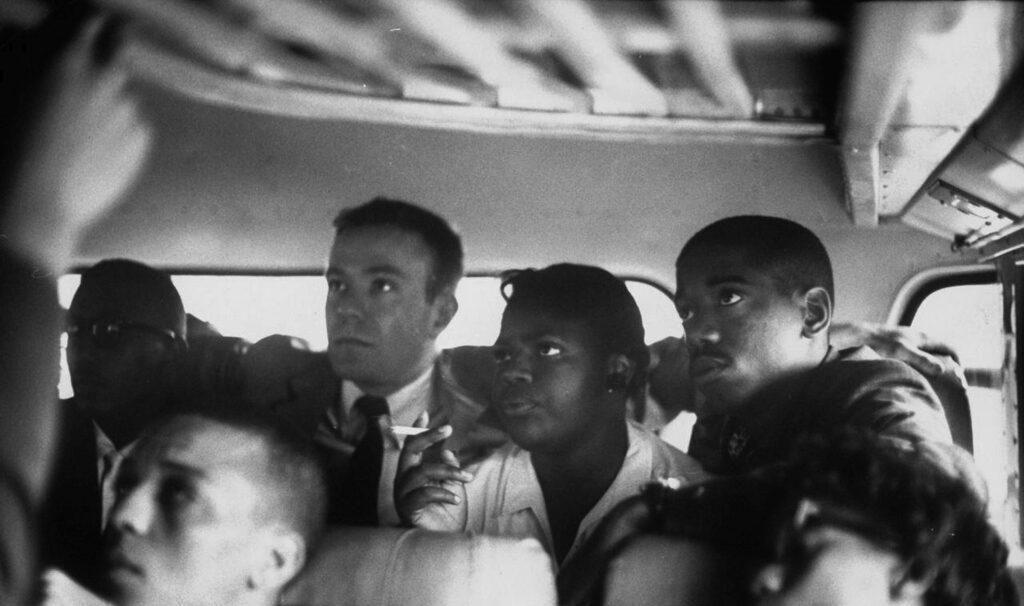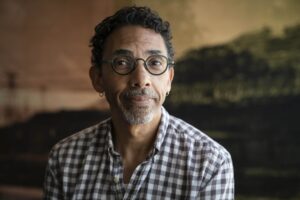From Mississippi to Madrid: Models for the World

Freedom Riders on a bus making a test trip into Mississippi, May 1961. Photo Paul Schutzer. CC BY 2.0.
ALBA Honorary Board Member Robin D.G. Kelley spoke in September at ALBA’s Bay Area celebration. Here is the complete text of his address. See below for the video recording.
Greetings, comrades. Congratulations to ALBA for another year of keeping the flame alive. And thank you for inviting me to say a few words in recognition of June Gipson of My Brother’s Keeper and the Open Arms Clinic, two extraordinary organizations by the way. I wanted to use this time to honor Mississippi’s history of freedom fighters and their connections to Spain.
I decided to steal the title of James Yates’ book From Mississippi to Madrid. Of course, for Yates, it’s the story of his journey to becoming an American radical. For me, the title really indicates parallels and connections—and some of those parallels and connections are personal. My sister, for example, Makani Themba, moved to Jackson deliberately, recently, to help her friends and comrades build a new society there. I’ve long considered Mississippi and Spain as two of the finest examples of radical possibility; places where visions of social democracy merged that could have been, and still could be, a model for the world.
We don’t always think of Mississippi or the US South in the same way. It’s often derided as a kind of political backwater: a place of reaction, home of Trumpism, and so on. But we don’t know our history. The truth is that, much like in Spain, in Mississippi fascism was a ruling class response to the revolutionary insurgency of working people, especially Black working people. The South has long been and continues to be the epicenter of the country’s most radical democratic movements: reconstruction, populism, biracial labor struggles, the Poor People’s campaign—today and 50 years ago. Jim Crow lynching and disenfranchisement—what I’m calling fascism—were designed to crush interracial movements fighting to expand democracy, protect the rights of working people, redistribute land, dismantle the plantation oligarchy, and guarantee free education and health care. Mississippi and other Southern States, in fact, passed the most draconian anti-labor, anti-Black, and anti-immigrant laws, not because they were conservative States, on the contrary, but in order to suppress a radical vision. And they only succeeded because they were able to eliminate nearly half the electorate. Half the people couldn’t vote.
And as we know, racism worked. Racism convinced white workers that their interests aligned closer to the ruling classes than to Black and Indigenous Peoples. Now, it may seem strange to say that fascism first emerged in the United States, in the US South, long before it arose in Europe. But Black members of the Lincoln Brigade had been saying it the moment they set foot on Spanish soil. As Walter Garland put it, “We can’t forget for a minute that the oppression of the Negro is nothing more than a very concrete form, the clearest expression of fascism. In other words, we saw in Spain those who chain us in America to cotton fields and brooms.”
Some also saw in Spain how racism was used to undermine the prospects of solidarity. Spanish colonialism in anti-Black racism against the Moors ensured that North Africans ended up fighting for Franco. Langston Hughes wrote a beautiful poem titled “Letter from Spain” that captures this contradiction. He wrote:
We captured a wounded Moor today.
He was just as dark as me.
I said, Boy, what you been doin’ here
Fightin’ against the free?
Both Spain and Mississippi, in fact, enjoyed the benefits of brigades, as it were. That is, volunteers who came there to fight for freedom and democracy. In Spain there was the Lincoln Brigade, the Washington Brigade, the Garabaldis and so on; in Mississippi there was the Student Nonviolent Coordinating Committee (SNCC), Freedom Summer, and the Republic of New Africa. In the Lincoln Brigade, some of the volunteers were from Mississippi, like Eluard Luchell McDaniels, who was from Lumberton, just south of Hattiesburg.
And of course, there was James Yates, born in 1906, in Quitman, Mississippi. He was influenced by his uncle as a follower of Marcus Garvey, who eventually moved to the all-Black town of Boley, Oklahoma. Yates was nourished on stories of another uncle of his, who once defended his family from the Klan with guns, and of the Irish immigrant neighbor who gave him the ammunition. He would eventually migrate to Chicago, join the labor movement and the Communist Party, and then go off to Spain.
Quitman is a very special place. Quitman and the neighboring town of Stonewall, for example, is where in 2015, the community mobilized to demand justice for Jonathan Sanders, a 39-year-old Black man choked to death by police while riding a horse and buggy. In so many ways, the Mississippi movement—SNCC, the Mississippi Freedom Democratic Party, the Mississippi Freedom Labor Union—fought for a social and economic justice agenda. That was no different from that of the Republican antifascist forces in Spain. That is, they fought for economic justice, for the redistribution of land and wealth, and for workers’ power.
The provisional government of the Republic of New Africa established its base in Mississippi around 1971 and purchased land, set up cooperative farms, and built institutions. And despite relentless state repression, including a shootout, the Republic of New Africa took root in the city of Jackson, Mississippi. Then, in 2013, in an historical election, the late Chokwe Lumumba (1947-2014), a radical lawyer and leader of the New Afrikan People’s Organization in the Malcolm X grassroots movement, was elected mayor of Jackson.
Lumumba was part of a movement that envisioned the Jackson Plan, designed to transform the city into a model of radical social democracy by establishing a solidarity economy very much like that of the Mondragón Corporation in Spain’s Basque region through worker cooperatives, ecofriendly community gardens, inexpensive energy-efficient housing, and developing community and conservation land trusts to make land available for all, especially to house the homeless. He also launched People’s Assemblies, which are open meetings to discuss community needs, ensure democratic participation, and mobilize working people to win political power.
And that they did: The People’s Assemblies were responsible for Chokwe Lumumba’s victory as well as the election of Jackson’s current mayor, his son, Chokwe Antar Lumumba. Rukia Lumumba, Antar’s sister, founded the People’s Advocacy Institute, which advances the transformative justice agenda to resist mass criminalization, build collective political and economic power, and promote environmental sustainability as well as community wealth, safety and racial, gender, and sexual equality.
Let me end with the prescient words of James Yates, who wrote in his book:
I was just beginning to learn about the reality of Spain and Europe, but I knew what was at stake. There the poor, the peasants, the workers and the unions, the socialists and the communists, together had won an election against the big landowners, the monarchy and the right-wingers in the military. It was the kind of victory that would have brought Black people to the top levels of government if such an election had been won in the USA. A black man would be governor of Mississippi. The new government in Spain was dividing its wealth with the peasants. Unions were organizing in each factory and social services were being introduced. Spain was the perfect example of the world I dreamed of. (95-96)
The world James Yates dreamed of is struggling to this day to come into being in places like Mississippi, thanks to the hard work of June Gipson and My Brother’s Keeper, the Open Arms Clinic, both organizations making possible a liberatory future for the LGBTQ community, the People’s Advocacy Institute and of course, ALBA. This is a legacy of the Spanish Civil War. It is the legacy of the Black struggle to democratize the United States—and ultimately the world. And of course, it’s not over. Free the land!
Robin D.G. Kelley, a member of ALBA’s Honorary Board, is the Distinguished Professor and Gary B. Nash Endowed Chair in U.S. History at UCLA. This text was read at ALBA’s event “A Legacy of Hope and Activism” in September 2021. See the video here.













